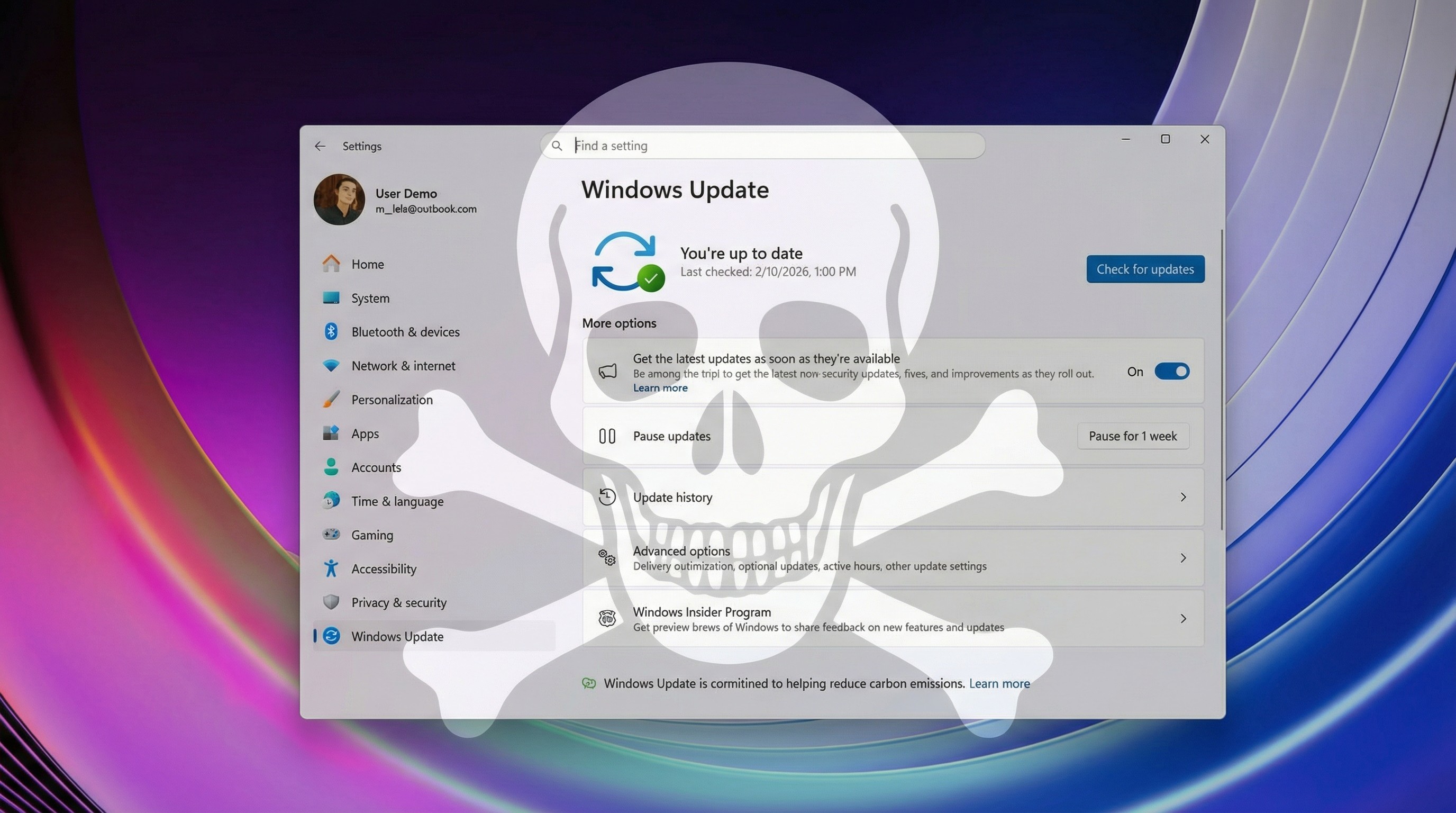Head to Head: HTC Radar vs. Samsung Focus Flash
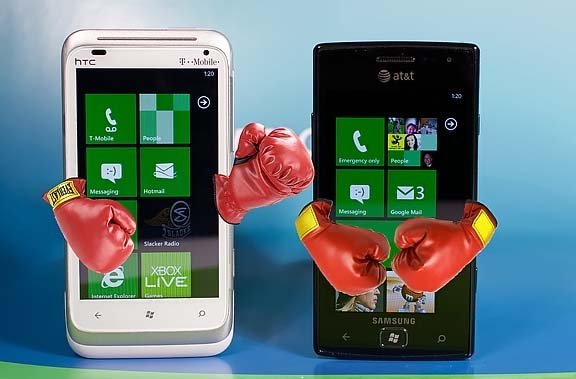
All the latest news, reviews, and guides for Windows and Xbox diehards.
You are now subscribed
Your newsletter sign-up was successful
The HTC Radar and Samsung Focus Flash can both be considered entry level or budget Windows Phones. They both have low pricing points when compared to their big brothers the HTC Titan and Samsung Focus S. And they both have scaled back features (smaller screen, less memory) but meet minimum specs.
While both may be considered an entry level Windows Phone, both are solid performers within their own right. We've reviewed both and find them both be be quality Windows Phones in their own right.
Now we'll see how both measure up against one another. And for that, you'll need to slide on past the break.
We've mentioned this before but with Windows Phone (the OS) being fairly consistent from phone to phone, the choice of which Windows Phone (the device) is best boils down to the hardware and design. There will be slight variations with software add-ons (AT&T app suit, HTC Hub, Samsung NOW, etc.) from manufacturer to manufacturer and carrier to carrier but for the most part, Mango is Mango regardless of which phone you choose.
Another challenge with a head to head comparison of this nature is that one Windows Phone is from T-Mobile and the other from AT&T. Wireless Service quality has many variables and service performance can vary from city to city. We'll keep the choice of which has the better wireless provider to the readers and concentrate solely on the devices.
Design
In size and weight, the HTC Radar and Samsung Flash can easily be considered compact Windows Phones.
The HTC Radar measures 4.7 x 2.42 x .43 inches and weighs in at 4.83 ounces.
All the latest news, reviews, and guides for Windows and Xbox diehards.
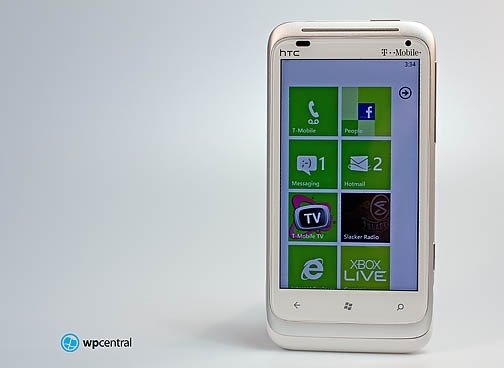
The Samsung Focus Flash measures 4.57 x 2.31 x .43 inches and weighs in at 4.1 ounces.
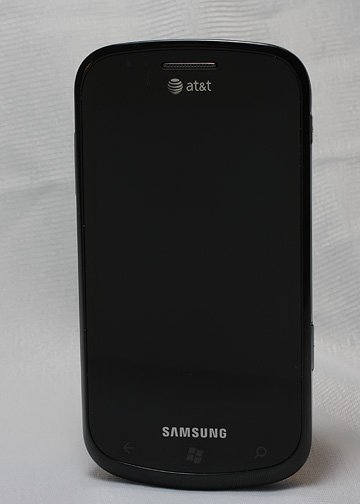
Both phones fit comfortably in the hand and pocket with curved sides and rounded edges. Buttons are laid out nicely on both phones and while I'm not a big fan of the white color on the Radar, both phones look good.
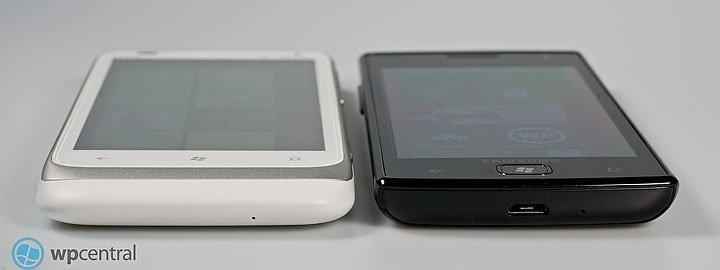
A few items of note with respect to design. First, while the HTC Radar has the traditional capacitive touch buttons the Flash has capacitive touch buttons for the Back and Search buttons while the Start Button is a physical button. The physical button is a nice touch and offers you an alternative way to wake up the phone.
Second, the HTC Radar has a uni-body design that is crafted from aluminum. The metal body gives the Radar a unique appearance and a tad more comfortable fit. The downside to the uni-body design on the Radar is that battery isn't accessible.
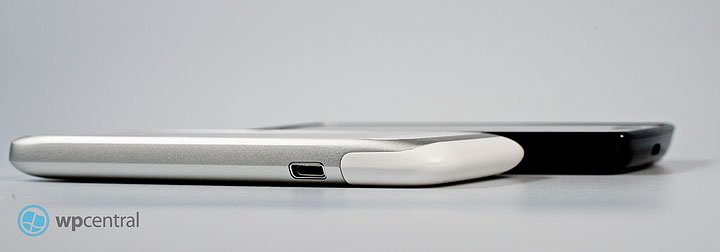
Overall, both Windows Phones are compact, comfortable in the hand and have good build quality. I would have to give the edge to the Radar with respect to overall design and feel but that's not to say the Flash is shabby by any means.
Screen
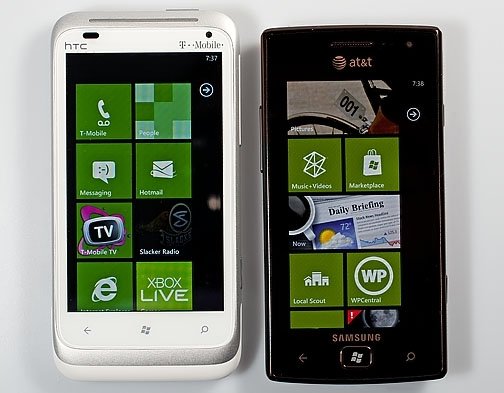
The centerpiece of any Windows Phone is the screen and both these Windows Phones have respectable displays.
The HTC Radar is fitted with a 3.8" WVGA screen while the Focus Flash sports a 3.7" Super AMOLED screen. While the Flash has slightly richer colors and more contrast, the Radar's screen quality is a noticeable improvement over HTC's first generation phones.
The Samsung Focus Flash does have the quirk with the auto-brightness that renders the screen a little dimmer than other Windows Phones. Thankfully, this oddity doesn't effect the quality of the display (just the brightness).
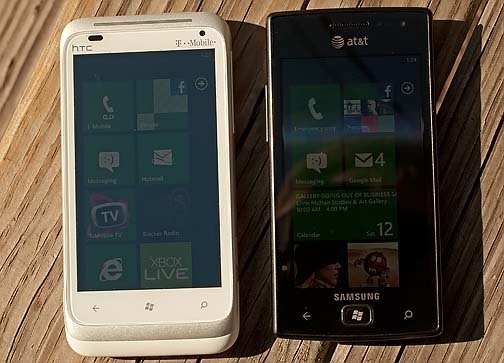
I will give a slight edge to the Focus Flash on screen quality and outdoor visibility. The deeper contrast of the Samsung Flash stands out just a hair better outdoors than the Radar.
Under the Hood
These two Windows Phones are very similar under the hood. Both have 512mb of Ram and 8GB of storage. There has been a lot of discussion on the 8GB of storage but it is what it is. 8GB's might not meet everyone's needs but for those just starting out or for those who may not load complete music collection on to their phone, 8GBs should be plenty.
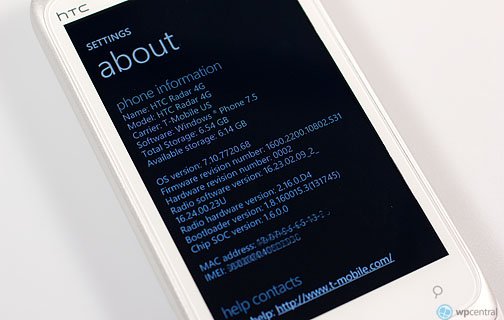
For the most part, the differences between these two Windows Phones are slight. The Radar has a 1ghz processor while the Flash a 1.4ghz processor. The Flash has a 1500mah battery while the Radar has a 1520mah battery.
The key difference under the hood is that the Flash has a digital compass and gyroscope while the Radar doesn't. The importance of these two sensors will vary from user to user. Personally, I won't miss the gyroscope but would miss the compass. The compass issue can likely be corrected with a firmware update and hopefully HTC will be johnny on the spot.
All in all, I'll give the advantage to the Samsung Focus Flash for what's under the hood simply because it has the compass and gyroscope. If these two features aren't important to you, then it's a push.
Camera
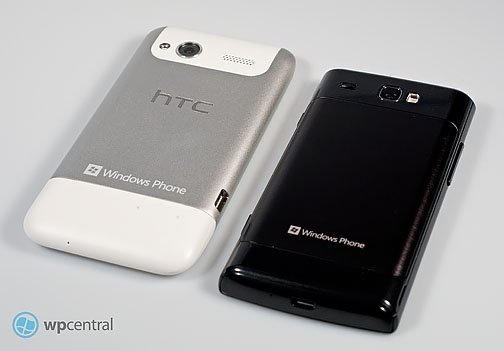
Again, and I know this sounds repetitive, but these two Windows Phones are solid performers with regards to their cameras.
The Radar is equipped with a f2.2 lens and BSI sensor. Both of which pulls in more light giving the Radar an edge for indoor pictures. The Flash on the other hand has a f2.6 lens and tends to offer better color saturation with images.
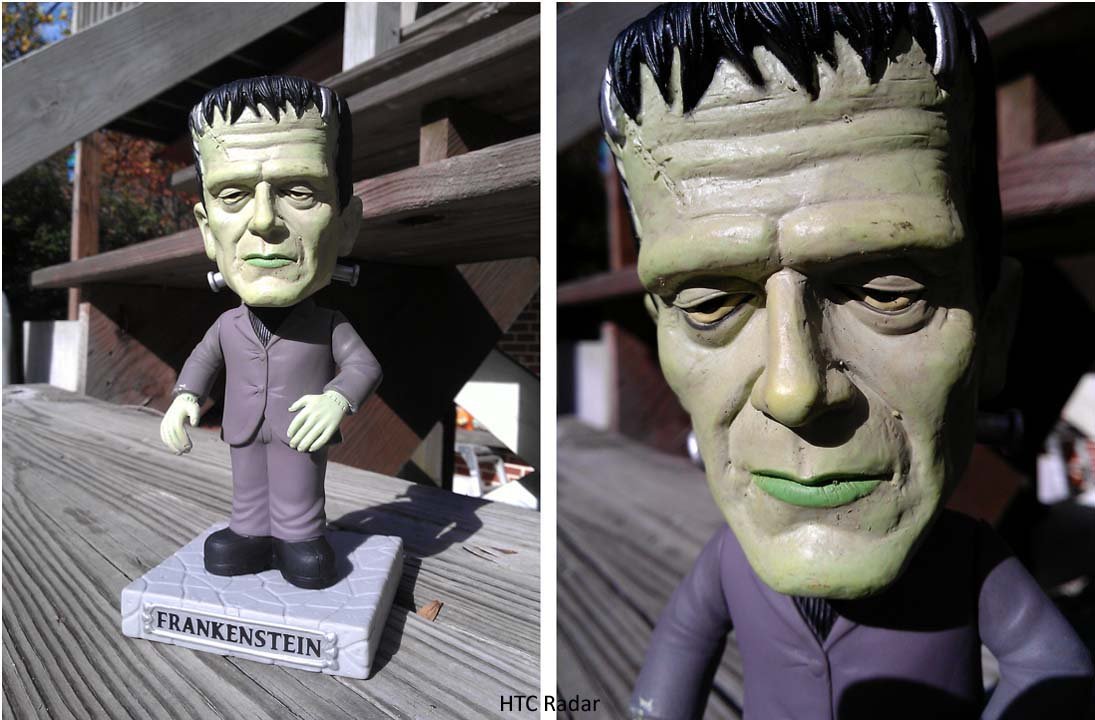
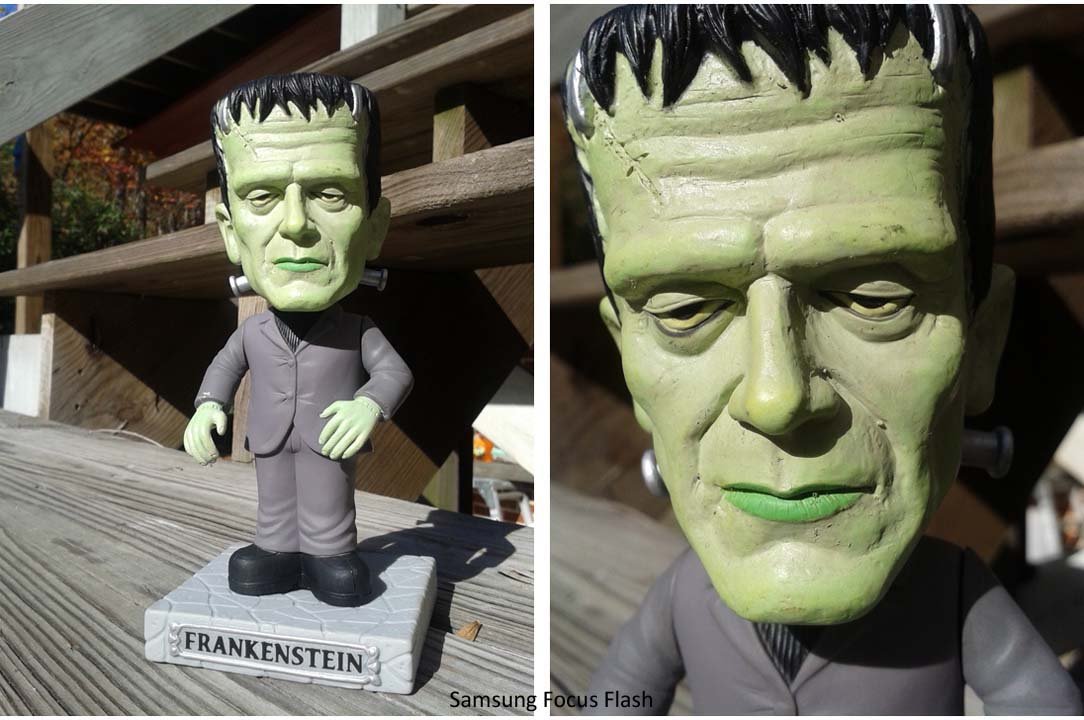
Overall, I liked the color saturation with the Flash but the faster lens of the Radar. Luckily, with processing software you can boost the saturation and bring the two cameras more in line with each others. It's harder to compensate the lens differences with processing software. Advantage goes to the Radar.


Video quality is equally nice with both the Flash and Radar. While some may prefer one over the other, I'm going to play it safe and call it a push with regards to video quality between these two Windows Phones.
Cost
This may be where you find the biggest difference with these two phones. AT&T is offering the Flash for $49 under contract and T-Mobile has the Radar running $99 under contract. Look around and you can find Amazon Wireless has the Flash going for $.01 under contract and the Radar is available from Wirefly for $49 under contract. Out of contract prices are running $339 and up for the Flash and $419 up with the Radar.
While both the Radar and Flash are reasonably price there is a good bit of difference between a penny and fifty bucks. Hopefully with the Holiday Season fast approaching we'll see more deals on these phones bringing the price of the Radar closer to the penny mark.
Call Quality
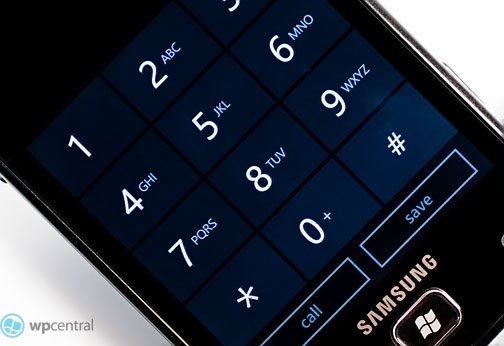
No earth shattering differences here.
Both the HTC Radar and Focus Flash performed nicely as phones. I did get the occasional echo on the Flash but it was not constant enough to be an annoyance (it also happened while in the same general area so it could be a coverage issue). Call volume, microphone and speaker performance was about equal. Phone performance should not be an issue with either phone. Call it another push.
Summing it all up
So which is the better phone? Coin toss.
While there are some distinct differences for the most part, comparing these two phones was mostly a push. The Radar lacks the compass and gyroscope, which may or may not be an issue. Some may not like the white color pattern of the Radar (it does grow on you) while others may prefer the black of the Flash. While screen quality is good on both, some may prefer the more contrasty Super AMOLED screen. While there are differences in these two phones, each difference will have a certain appeal to some while not much to others.
The bottom line is that there really isn't a bad Windows Phone between the two. However, if I was forced to choose between these two Windows Phones, I'd lean towards the Samsung Focus Flash. It boiled down to two issues. First, I can live without the gyroscope but I do enough outdoor hiking that I need the compass. Second, I just can't get past the white color pattern.
Having said that, if you are locked into T-Mobile and are looking for a compact, quality Windows Phone you will not be disappointed with the HTC Radar.
The closeness in quality and performance with the Focus Flash and HTC Radar simply illustrates the state of Windows Phones these days. With the OS being consistent, stable and dependable users can look at the phones to decide which hardware design and features suits their tastes and needs the best. The nice thing about having such a choice is that there's really not a bad one in the basket.

George is a former Reviews Editor at Windows Central, concentrating on Windows 10 PC and Mobile apps. He's been a supporter of the platform since the days of Windows CE and uses his current Windows 10 Mobile phone daily to keep up with life and enjoy a game during downtime.
